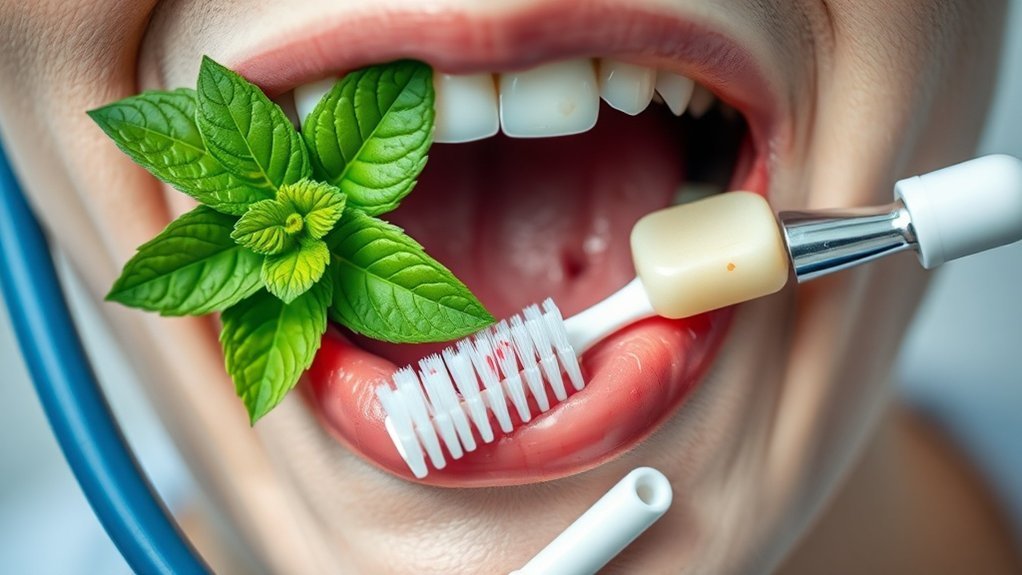Can You Tell if Your Bad Breath Signals a Deeper Health Problem
Bad breath, or halitosis, can signal deeper health issues if it persists despite good oral hygiene. It’s often caused by bacterial growth from food particles or poor dental care, but it may also indicate conditions like gum disease, diabetes, or liver problems. If you’re experiencing ongoing bad breath, it’s worth consulting a healthcare professional to rule out any serious concerns. Understanding the connections between your breath and overall health can provide insight into potential underlying issues.
Key Takeaways
- Persistent bad breath despite good oral hygiene may indicate underlying issues like gum disease or systemic diseases, such as diabetes or liver problems.
- Regular dental check-ups are crucial for identifying any dental or health problems that may cause halitosis.
- If bad breath is accompanied by other symptoms, such as a dry mouth or unusual taste, it may signal a deeper health concern.
- Ignoring ongoing bad breath could overlook significant health issues, making early intervention essential for overall health.
- Maintaining good oral hygiene and hydration can prevent bad breath, but persistent issues warrant a consultation with a healthcare professional.
Understanding Bad Breath: Common Causes
Bad breath, or halitosis, affects nearly 50% of adults at some point in their lives. Understanding the common causes of bad breath can help you manage it effectively. One primary cause is poor oral hygiene, which allows food particles to remain in your mouth, leading to bacterial growth. Certain foods, like garlic and onions, can also contribute to halitosis due to their strong odors. Additionally, dry mouth, or xerostomia, can exacerbate the issue, as saliva helps cleanse your mouth. Smoking and tobacco products are notorious for causing bad breath, as they dry out your mouth and leave unpleasant odors. Finally, underlying health conditions like sinus infections or gastrointestinal issues may also be to blame for persistent halitosis.
The Connection Between Oral Hygiene and Halitosis
Maintaining good oral hygiene is essential for preventing halitosis. Daily brushing removes food particles and plaque that contribute to bad breath, while staying hydrated helps wash away bacteria in your mouth. By prioritizing these habits, you can greatly reduce your risk of halitosis and improve your overall oral health.
Importance of Daily Brushing
While you may not realize it, daily brushing is crucial for maintaining good oral hygiene and preventing halitosis. Regular brushing effectively removes food particles and plaque that contribute to breath odor causes. When you neglect this indispensable practice, bacteria thrive in your mouth, leading to unpleasant smells and potential dental issues. By brushing at least twice a day, you help eliminate these bacteria and minimize the risk of gum disease, which can exacerbate bad breath. Additionally, using fluoride toothpaste strengthens your teeth and promotes overall oral health. Remember, good oral hygiene isn’t just about fresh breath; it’s also vital for your overall well-being. So, commit to daily brushing and keep your smile—and your breath—fresh.
Role of Hydration
Brushing your teeth is only part of the equation for fresh breath; staying hydrated plays a significant role in oral health as well. Proper hydration helps maintain saliva production, which is essential for combating breath odor. When you’re dehydrated, your mouth can become dry, allowing bacteria to thrive and produce foul-smelling compounds.
To keep your breath fresh, consider the following tips:
- Drink plenty of water throughout the day.
- Limit caffeine and alcohol, as they can contribute to dehydration.
- Chew sugar-free gum to stimulate saliva flow.
- Include hydrating foods, like fruits and vegetables, in your diet.
- Rinse your mouth with water after meals to wash away food particles.
Staying hydrated is vital for preventing halitosis and promoting overall oral health.
When Bad Breath Becomes a Health Concern
Bad breath can sometimes signal underlying health issues that need your attention. Common causes of halitosis may range from poor oral hygiene to more serious medical conditions. Knowing the signs and understanding when to seek help is essential for addressing the problem effectively.
Common Causes of Halitosis
Halitosis, commonly known as bad breath, can signal underlying health issues that deserve attention. Identifying the common causes is vital for finding a bad breath cure and addressing potential oral infections. Here are some typical contributors to halitosis:
- Poor oral hygiene
- Gum disease
- Dry mouth
- Food particles trapped between teeth
- Smoking or tobacco use
Each of these factors can lead to unpleasant odors and may indicate a more serious health concern. If you notice persistent bad breath despite good oral hygiene practices, it’s important to consult with a healthcare professional. Early intervention can help you tackle the root cause and improve your overall oral health. Don’t ignore the signs; take action to guarantee your well-being.
Signs of Serious Conditions
While occasional bad breath can be a nuisance, persistent halitosis may indicate serious health conditions that require your attention. If you notice ongoing bad breath, it could signal underlying issues like gum disease, which can lead to tooth loss and infections. Additionally, halitosis might be a sign of systemic disease, such as diabetes or liver problems. These conditions often produce distinctive odors that your body emits. Ignoring persistent bad breath isn’t advisable, as it may be your body’s way of alerting you to more significant health concerns. Staying vigilant about your oral health and recognizing these signs can be fundamental in addressing potential issues early on. Don’t overlook what your breath might be trying to tell you.
When to Seek Help
Have you noticed that your bad breath persists despite regular brushing and mouthwash use? If so, it might be time to seek help. Persistent breath odor can indicate underlying health issues that require attention. Consider consulting a healthcare professional if you experience:
- Bad breath that lasts beyond your oral care routine
- Additional symptoms like dry mouth or sore throat
- A metallic taste in your mouth
- Swelling or pain in your gums
- Unexplained weight loss or digestive issues
Addressing these signs early can lead to effective breath odor treatment and help maintain your overall health. Don’t ignore the situation; your breath could be signaling a deeper concern that needs professional evaluation.
Medical Conditions That May Cause Persistent Bad Breath
Persistent bad breath can often signal underlying medical conditions that warrant attention. If you’re experiencing chronic halitosis, it’s essential to seek a medical diagnosis, as various health issues may be involved. Conditions such as sinus infections, diabetes, and gastrointestinal disorders can contribute to unpleasant breath odors. In some cases, breath odor bacteria multiply due to dry mouth or poor oral hygiene, exacerbating the problem. Additionally, liver or kidney dysfunction can lead to distinctive breath smells that indicate a more serious issue. Understanding the potential health implications of bad breath is vital, as it can help you address any underlying conditions effectively. Don’t hesitate to consult a healthcare professional if you notice persistent bad breath.
The Role of Diet in Halitosis
Diet plays a significant role in the development of halitosis, as certain foods can contribute to bad breath. The state of your oral microbiome is heavily influenced by what you eat, affecting bacteria that produce odor. Here are some dietary factors that can exacerbate bad breath:
- Garlic and Onions: These contain sulfur compounds that linger in your system.
- Coffee: It can dry out your mouth, reducing saliva’s ability to wash away bacteria.
- Alcohol: Similar to coffee, it can lead to dehydration and dry mouth.
- Dairy Products: They can create an environment for odor-causing bacteria.
- Sugary Foods: Sugar feeds harmful bacteria, promoting bad breath.
Identifying Other Symptoms of Underlying Issues
While bad breath is often associated with dietary choices, it can also signal underlying health issues that require attention. Pay close attention to other symptoms that may accompany your bad breath. For instance, if you experience persistent dry mouth, it could indicate a problem with your immune system or dehydration. Unexplained weight loss, fatigue, or changes in your appetite may also suggest a more serious condition. Additionally, if your bad breath is accompanied by frequent infections or chronic sinus issues, this might signal an imbalance in your immune response. Recognizing these symptoms early can help you seek appropriate medical advice and address any potential health concerns before they escalate. Always consult a healthcare professional if you notice these signs.
Steps to Improve Breath and Overall Health
Addressing bad breath involves not only identifying potential health issues but also implementing practical steps to improve your breath and overall health. Here are some effective strategies:
- Maintain good dental care by brushing and flossing daily.
- Use mouthwash for breath freshening and to kill bacteria.
- Stay hydrated to help wash away food particles and bacteria.
- Chew sugar-free gum to stimulate saliva production, which helps neutralize odors.
- Avoid foods and drinks that contribute to bad breath, like garlic, onions, and coffee.
When to Consult a Healthcare Professional
When should you seek help from a healthcare professional regarding bad breath? If you’re experiencing chronic halitosis that doesn’t improve with regular oral hygiene practices, it’s time to consult a dentist or doctor. Persistent bad breath can signal underlying health issues, including gum disease, sinus infections, or gastrointestinal problems. Additionally, if you notice a sudden change in your breath or other symptoms like dry mouth or difficulty swallowing, don’t hesitate to seek advice. Regular dental cleanings are essential for maintaining oral health and can help identify any problems early on. Remember, addressing bad breath isn’t just about freshening your breath; it’s about ensuring your overall health and well-being. Don’t ignore the signs—take action for your health.
Frequently Asked Questions
Can Bad Breath Be a Sign of Diabetes?
Yes, bad breath can be a sign of diabetes. When your body doesn’t properly use insulin, it may produce excess ketones, leading to a fruity odor in your breath. It’s important to consult a healthcare professional.
How Can Stress Affect My Breath Odor?
Stress can lead to dry mouth, reducing saliva production, which helps neutralize odor-causing bacteria. This can result in unpleasant breath. Managing stress through relaxation techniques can improve both your overall well-being and breath freshness.
Does Smoking Worsen Bad Breath?
Smoking acts like a dark cloud, obscuring fresh air. It does worsen bad breath by drying your mouth and fostering bacteria. Quitting can clear the air, improving your breath and overall health considerably.
Can Allergies Contribute to Persistent Bad Breath?
Yes, allergies can contribute to persistent bad breath. When you’re congested, mucus buildup can create an environment for bacteria, leading to unpleasant odors. Managing your allergies may help improve your breath considerably.
Is Bad Breath Contagious?
Bad breath isn’t contagious. It’s typically caused by bacteria in your mouth, poor dental hygiene, or specific foods. Maintaining good oral hygiene and regular dental check-ups can help eliminate it and improve your breath.
Conclusion
To sum up, understanding your bad breath is key to your overall health. By recognizing common causes, maintaining good oral hygiene, and being aware of potential medical conditions, you can take proactive steps. Monitor your diet, identify other symptoms, and improve not just your breath but your well-being. If persistent halitosis persists despite these efforts, don’t hesitate to consult a healthcare professional. Your breath might be the signal your body needs to communicate about deeper health issues.






